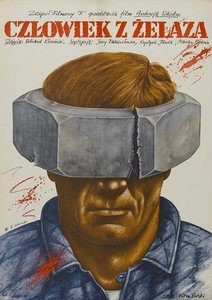| Man of Iron | |
|---|---|
 | |
| Directed by | Andrzej Wajda |
| Written by | Aleksander Ścibor-Rylski |
| Starring | Jerzy Radziwiłowicz Krystyna Janda |
| Cinematography | Edward Kłosiński |
| Distributed by | United Artists Classics |
Release date |
|
Running time | 153 minutes |
| Country | Poland |
| Language | Polish |
| Box office | $492,035[1] |
Man of Iron (Polish: Człowiek z żelaza) is a 1981 film directed by Andrzej Wajda. It depicts the Solidarity labour movement and its first success in persuading the Polish government to recognize workers' right to an independent union.
The film continues the story of Maciej Tomczyk, the son of Mateusz Birkut, the protagonist of Wajda's earlier film, Man of Marble. Here, Maciej is a young worker involved in the anti-Communist labour movement, described as "the man who started the Gdańsk Shipyard strike", and a journalist working for the Communist regime's radio station, who is given the task of slandering Maciej. The young man is clearly intended as a parallel to Lech Wałęsa (who appears as himself in the movie).
Man of Iron clarifies the ending of Man of Marble, which left the death of Mateusz Birkut ambiguous. Man of Iron explicitly states that Mateusz was killed in clashes at the shipyards in 1970.[2]
The film was made during the brief thaw in Communist censorship that appeared between the formation of Solidarity in August 1980 and its suppression in December 1981, and as such it is remarkably critical of the Communist regime. Because of this it was banned in 1981 by the Polish government.[3] The film won the Palme d'Or and the Prize of the Ecumenical Jury at the 1981 Cannes Film Festival.[4] It was also nominated for the Academy Award for Best Foreign Language Film.[5] American filmmaker Martin Scorsese recognized the film as one of the masterpieces of Polish cinema and in 2013 he selected it for screening alongside films such as Ashes and Diamonds, Innocent Sorcerers, Knife in the Water and The Promised Land in the United States, Canada and United Kingdom as part of the Martin Scorsese Presents: Masterpieces of Polish Cinema festival of Polish films.[6]
- ^ Man of Iron at Box Office Mojo
- ^ "Man of Iron". University of California Cine Files. March 1982. Archived from the original on January 18, 2015. Retrieved October 18, 2011.
- ^ Ford, Charles; Hammond, Robert (2015-05-07). Polish Film: A Twentieth Century History. ISBN 9781476608037.
- ^ "Festival de Cannes: Man of Iron". festival-cannes.com. Retrieved 2009-05-31.
- ^ "The 54th Academy Awards (1982) Nominees and Winners". oscars.org. Retrieved 2011-10-08.
- ^ "UK Film List / Martin Scorsese Presents". mspresents.com. Archived from the original on October 17, 2015. Retrieved December 26, 2022.